#licensor
Text
Amateur ebony with big tits works white dick like a goddess
Skinny anal asian slut Saya Song
Men caught pissing video gay porn finder Conner Bradley and Tyler
Confessions of a Gangbang Slut Compilation
Hermanastra follada porque es una cerda muy cachonda
So BEHAART war meine Fotze NOCH NIE!
School boys sex group and white men fat ass having gay they have the
Bra and panties teen
Valeriy McQueen sexy teen shemale
gives stepson his first blowjob she deepthroats his small cock
#blattiform#amphibalus#zigzag-fashion#iconomachal#otocyst#hemstitching#channeler#slack-twisted#bugginess#enemied#dostoevsky#bejezebel#nonconjugation#unmad#licensor#necessitarian#sexybeard#incisura#staphylinid#nongraduate
0 notes
Text
chrimbus season... if Winx had released in the 80s we could have had a comic with the Winx helping the Virgin Mary going to betlehem to give birth to Baby Jesus and dolls to celebrate for your nativity scene
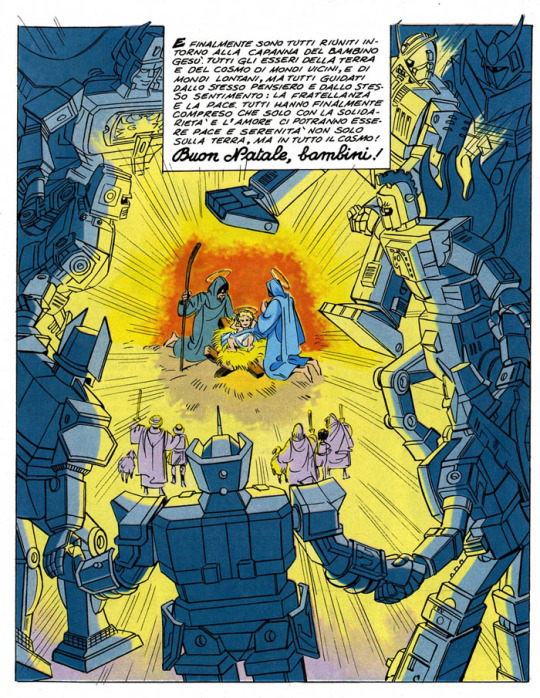
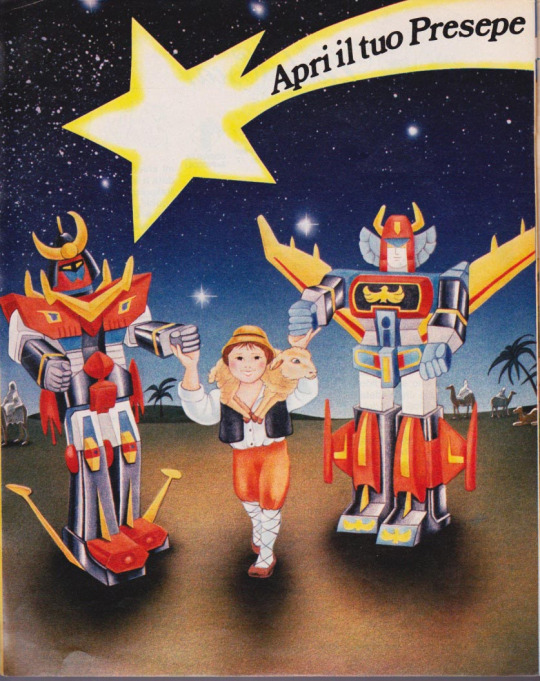
like this
this is what Iginio Straffi grew up with as a catholic
#not winx#back when japanese licensors did not give a FUCK#yeah sure. put gundam and mazinga near baby jesus
7 notes
·
View notes
Text
Daily Comic Journal: March 19, 2022: "My Day With Charles Schulz, Part 2."
Here’s the book he gave us:
And here’s what he signed in my copy:
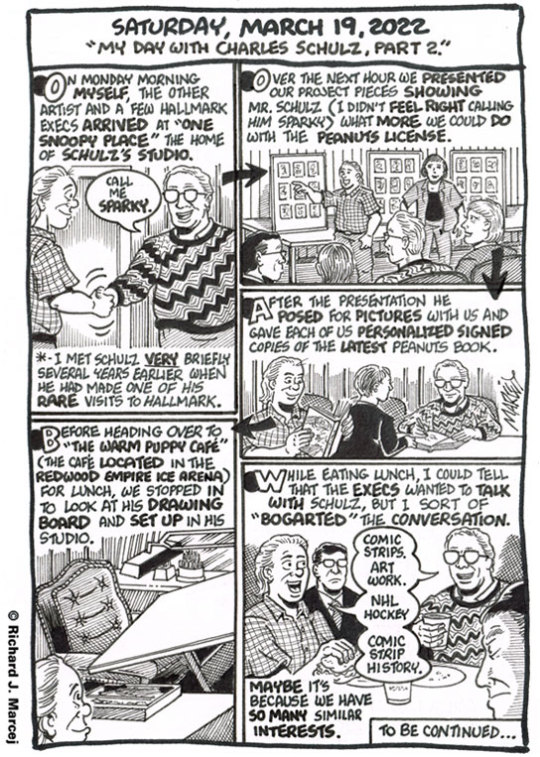
View On WordPress
#Books#Cartooning#Cartoonists#Charles Schulz#Comic Strips#Drawing Board#Hallmark#Licensing#Licensors#NHL Hockey#Peanuts#Santa Rosa#Studio
2 notes
·
View notes
Text
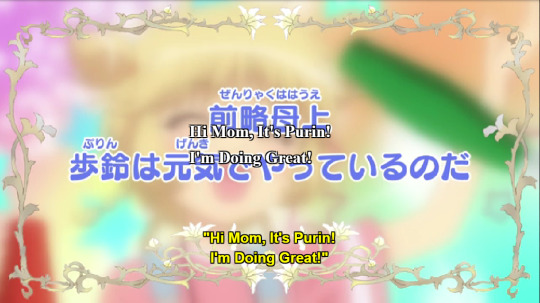
ohhhhh i can already tell this is gonna hurt
#tokyo mew mew#tokyo mew mew new#tokyo mew mew spoilers#side note: hey sentai? it's bu ling or pudding not purin#y'all got this right with your translation last season what happened here#did you get a new translator or did the licensors step in? i'm gonna say the latter#(and while i'm at it it's quiche not kish)#today's episode was cute#i like that we're getting these character focused episodes#although i totally thought mint was gonna find the mew aqua here
10 notes
·
View notes
Text
*looks at the futekiya dumpster fire*

anyway.
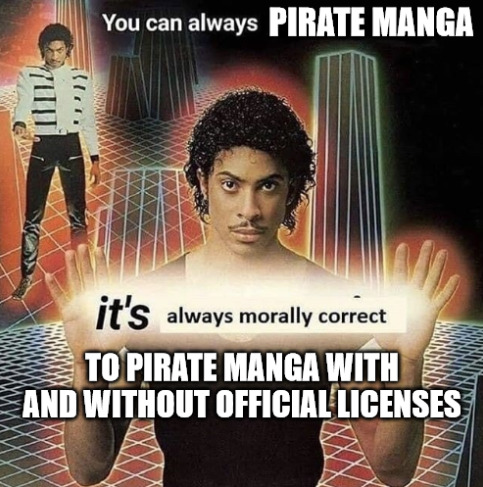
19 notes
·
View notes
Text
Ok so like, when’s the Tokyo Mew Mew sequel manga & Au Lait spin off getting licensed? Like it’s not even out “digital only”, what’s going on at Kodansha USA?
#au lait just finished so maybe they were waiting for that but#majobun chatter#for the licensor sitting on all the good magical girl manga they don't use it#how about instead re-releasing Sailor Moon in in brick form for the 4th time you try something else#really dumb venting
19 notes
·
View notes
Text
i think another criticism i have abt mty is that it doesn't do too good of a job developing the characters. there are four that i love to see and should be present, but then recently the series brought back a good amount that i didn't feel the need to see again, while not developing them to be likable, either. so when vol 10 has guideau on the sidelines and ashaf outright gone, with phanora and johan getting some appearances im like 😴
#personal#another reason i wasnt into the last volume as much was bc i couldnt remember who the hell those kids were#even if there was a wild house turned labyrinth that gets flooded w the ocean and shark chase scene shit going on#and i dont like dunward. he left and i was like thank god#i can see him coming back but he shouldve been gone longer. like how phanora and johan came back#those two absolutely should be opposite to guideau and ashaf tho. theyre more interesting than the ice guy or those kids#it wouldve been funnier if u flat out forgot abt dunward and then suddenly the vampire is here w all these mages#anyways... damn licensors or whatever kind of#volume 11 releases october 10th so i'll probably forget the series exists until the anime
2 notes
·
View notes
Text
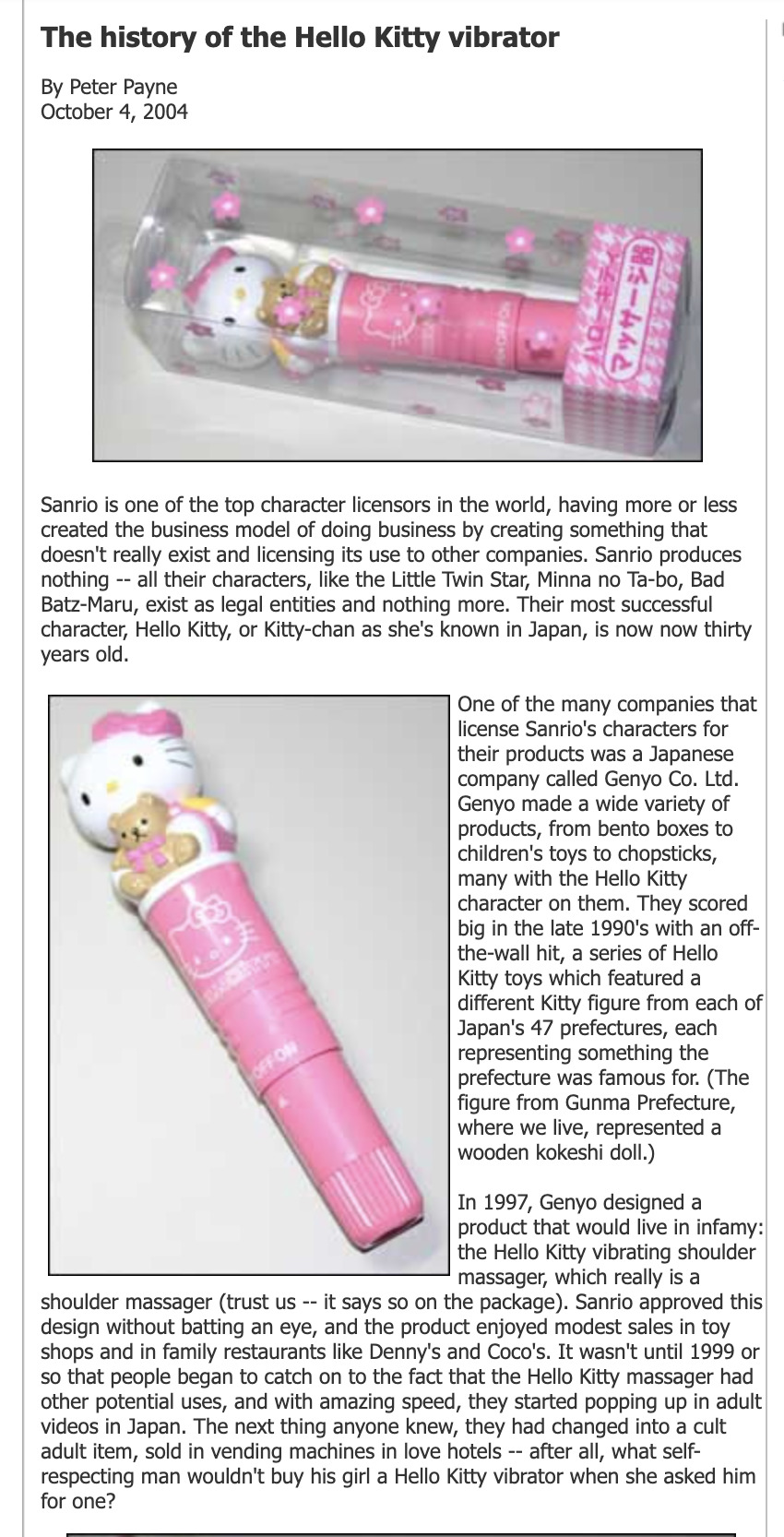
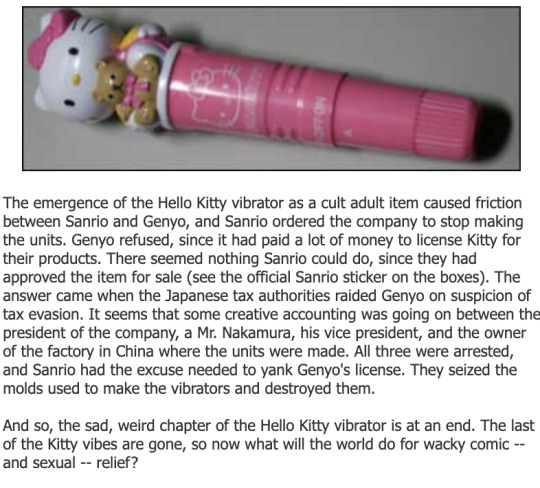
I found myself having, not exactly an argument recently, but a highly opinionated conversation with someone who did not believe my assertion that once upon a time there were official Hello Kitty vibrators. With the aid of the Wayback Machine, I found this article, and thought the world at large might enjoy it too...


Here's the text of the article:
The history of the Hello Kitty vibrator
By Peter Payne
October 4, 2004
Sanrio is one of the top character licensors in the world, having more or less created the business model of doing business by creating something that doesn't really exist and licensing its use to other companies. Sanrio produces nothing -- all their characters, like the Little Twin Star, Minna no Ta-bo, Bad Batz-Maru, exist as legal entities and nothing more. Their most successful character, Hello Kitty, or Kitty-chan as she's known in Japan, is now now thirty years old.
One of the many companies that license Sanrio's characters for their products was a Japanese company called Genyo Co. Ltd. Genyo made a wide variety of products, from bento boxes to children's toys to chopsticks, many with the Hello Kitty character on them. They scored big in the late 1990's with an off-the-wall hit, a series of Hello Kitty toys which featured a different Kitty figure from each of Japan's 47 prefectures, each representing something the prefecture was famous for. (The figure from Gunma Prefecture, where we live, represented a wooden kokeshi doll.)
In 1997, Genyo designed a product that would live in infamy: the Hello Kitty vibrating shoulder massager, which really is a shoulder massager (trust us -- it says so on the package). Sanrio approved this design without batting an eye, and the product enjoyed modest sales in toy shops and in family restaurants like Denny's and Coco's. It wasn't until 1999 or so that people began to catch on to the fact that the Hello Kitty massager had other potential uses, and with amazing speed, they started popping up in adult videos in Japan. The next thing anyone knew, they had changed into a cult adult item, sold in vending machines in love hotels -- after all, what self-respecting man wouldn't buy his girl a Hello Kitty vibrator when she asked him for one?
The emergence of the Hello Kitty vibrator as a cult adult item caused friction between Sanrio and Genyo, and Sanrio ordered the company to stop making the units. Genyo refused, since it had paid a lot of money to license Kitty for their products. There seemed nothing Sanrio could do, since they had approved the item for sale (see the official Sanrio sticker on the boxes). The answer came when the Japanese tax authorities raided Genyo on suspicion of tax evasion. It seems that some creative accounting was going on between the president of the company, a Mr. Nakamura, his vice president, and the owner of the factory in China where the units were made. All three were arrested, and Sanrio had the excuse needed to yank Genyo's license. They seized the molds used to make the vibrators and destroyed them.
And so, the sad, weird chapter of the Hello Kitty vibrator is at an end. The last of the Kitty vibes are gone, so now what will the world do for wacky comic -- and sexual -- relief?
44K notes
·
View notes
Text
Thinking about how Seven Seas Entertainment describes Yumi Tamura as the author of both Basara and 7SEEDS, when only one is avaliable legally in any capacity, and Basara is just now as I'm typing this getting out of OOP hell through...digital release on VIZ. I'm sorry, what were you saying about manga piracy again?
#manga licensors make me not want to commit violence challenge#it just feels like mocking at this point
1 note
·
View note
Photo

The English volume one of Gadget and Japanese editions of volumes two and three
0 notes
Text
Good riddance to the Open Gaming License
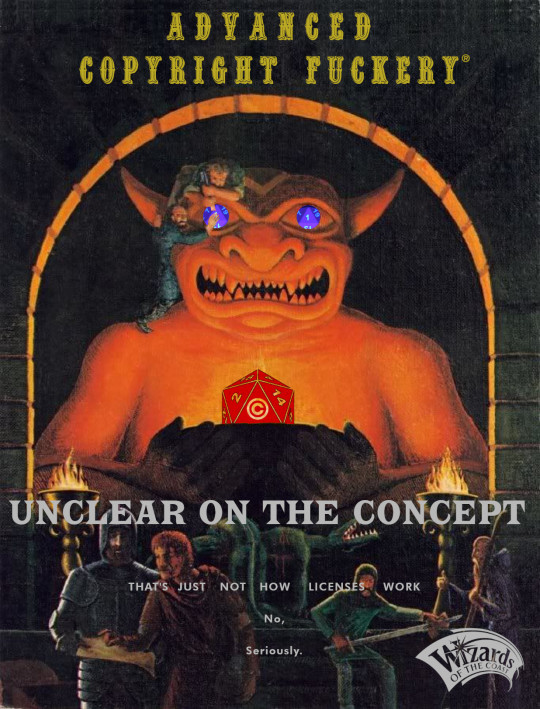
Last week, Gizmodo’s Linda Codega caught a fantastic scoop — a leaked report of Hasbro’s plan to revoke the decades-old Open Gaming License, which subsidiary Wizards Of the Coast promulgated as an allegedly open sandbox for people seeking to extend, remix or improve Dungeons and Dragons:
https://gizmodo.com/dnd-wizards-of-the-coast-ogl-1-1-open-gaming-license-1849950634
The report set off a shitstorm among D&D fans and the broader TTRPG community — not just because it was evidence of yet more enshittification of D&D by a faceless corporate monopolist, but because Hasbro was seemingly poised to take back the commons that RPG players and designers had built over decades, having taken WOTC and the OGL at their word.
Gamers were right to be worried. Giant companies love to rugpull their fans, tempting them into a commons with lofty promises of a system that we will all have a stake in, using the fans for unpaid creative labor, then enclosing the fans’ work and selling it back to them. It’s a tale as old as CDDB and Disgracenote:
https://en.wikipedia.org/wiki/CDDB#History
(Disclosure: I am a long-serving volunteer board-member for MetaBrainz, which maintains MusicBrainz, a free, open, community-managed and transparent alternative to Gracenote, explicitly designed to resist the kind of commons-stealing enclosure that led to the CDDB debacle.)
https://musicbrainz.org/
Free/open licenses were invented specifically to prevent this kind of fuckery. First there was the GPL and its successor software licenses, then Creative Commons and its own successors. One important factor in these licenses: they contain the word “irrevocable.” That means that if you build on licensed content, you don’t have to worry about having the license yanked out from under you later. It’s rugproof.
Now, the OGL does not contain the word “irrevocable.” Rather, the OGL is “perpetual.” To a layperson, these two terms may seem interchangeable, but this is one of those fine lawerly distinctions that trip up normies all the time. In lawyerspeak, a “perpetual” license is one whose revocation doesn’t come automatically after a certain time (unlike, say, a one-year car-lease, which automatically terminates at the end of the year). Unless a license is “irrevocable,” the licensor can terminate it whenever they want to.
This is exactly the kind of thing that trips up people who roll their own licenses, and people who trust those licenses. The OGL predates the Creative Commons licenses, but it neatly illustrates the problem with letting corporate lawyers — rather than public-interest nonprofits — unleash “open” licenses on an unsuspecting, legally unsophisticated audience.
The perpetual/irrevocable switcheroo is the least of the problems with the OGL. As Rob Bodine— an actual lawyer, as well as a dice lawyer — wrote back in 2019, the OGL is a grossly defective instrument that is significantly worse than useless.
https://gsllcblog.com/2019/08/26/part3ogl/
The issue lies with what the OGL actually licenses. Decades of copyright maximalism has convinced millions of people that anything you can imagine is “intellectual property,” and that this is indistinguishable from real property, which means that no one can use it without your permission.
The copyrightpilling of the world sets people up for all kinds of scams, because copyright just doesn’t work like that. This wholly erroneous view of copyright grooms normies to be suckers for every sharp grifter who comes along promising that everything imaginable is property-in-waiting (remember SpiceDAO?):
https://onezero.medium.com/crypto-copyright-bdf24f48bf99
Copyright is a lot more complex than “anything you can imagine is your property and that means no one else can use it.” For starters, copyright draws a fundamental distinction between ideas and expression. Copyright does not apply to ideas — the idea, say, of elves and dwarves and such running around a dungeon, killing monsters. That is emphatically not copyrightable.
Copyright also doesn’t cover abstract systems or methods — like, say, a game whose dice-tables follow well-established mathematical formulae to create a “balanced” system for combat and adventuring. Anyone can make one of these, including by copying, improving or modifying an existing one that someone else made. That’s what “uncopyrightable” means.
Finally, there are the exceptions and limitations to copyright — things that you are allowed to do with copyrighted work, without first seeking permission from the creator or copyright’s proprietor. The best-known exception is US law is fair use, a complex doctrine that is often incorrectly characterized as turning on “four factors” that determine whether a use is fair or not.
In reality, the four factors are a starting point that courts are allowed and encouraged to consider when determining the fairness of a use, but some of the most consequential fair use cases in Supreme Court history flunk one, several, or even all of the four factors (for example, the Betamax decision that legalized VCRs in 1984, which fails all four).
Beyond fair use, there are other exceptions and limitations, like the di minimis exemption that allows for incidental uses of tiny fragments of copyrighted work without permission, even if those uses are not fair use. Copyright, in other words, is “fact-intensive,” and there are many ways you can legally use a copyrighted work without a license.
Which brings me back to the OGL, and what, specifically, it licenses. The OGL is a license that only grants you permission to use the things that WOTC can’t copyright — “the game mechanic [including] the methods, procedures, processes and routines.” In other words, the OGL gives you permission to use things you don’t need permission to use.
But maybe the OGL grants you permission to use more things, beyond those things you’re allowed to use anyway? Nope. The OGL specifically exempts:
Product and product line names, logos and identifying marks including trade dress; artifacts; creatures characters; stories, storylines, plots, thematic elements, dialogue, incidents, language, artwork, symbols, designs, depictions, likenesses, formats, poses, concepts, themes and graphic, photographic and other visual or audio representations; names and descriptions of characters, spells, enchantments, personalities, teams, personas, likenesses and special abilities; places, locations, environments, creatures, equipment, magical or supernatural abilities or effects, logos, symbols, or graphic designs; and any other trademark or registered trademark…
Now, there are places where the uncopyrightable parts of D&D mingle with the copyrightable parts, and there’s a legal term for this: merger. Merger came up for gamers in 2018, when the provocateur Robert Hovden got the US Copyright Office to certify copyright in a Magic: The Gathering deck:
https://pluralistic.net/2021/08/14/angels-and-demons/#owning-culture
If you want to learn more about merger, you need to study up on Kregos and Eckes, which are beautifully explained in the “Open Intellectual Property Casebook,” a free resource created by Jennifer Jenkins and James Boyle:
https://web.law.duke.edu/cspd/openip/#q01
Jenkins and Boyle explicitly created their open casebook as an answer to another act of enclosure: a greedy textbook publisher cornered the market on IP textbook and charged every law student — and everyone curious about the law — $200 to learn about merger and other doctrines.
As EFF Senior Staff Attorney Kit Walsh writes in her must-read analysis of the OGL, this means “the only benefit that OGL offers, legally, is that you can copy verbatim some descriptions of some elements that otherwise might arguably rise to the level of copyrightability.”
https://www.eff.org/deeplinks/2023/01/beware-gifts-dragons-how-dds-open-gaming-license-may-have-become-trap-creators
But like I said, it’s not just that the OGL fails to give you rights — it actually takes away rights you already have to D&D. That’s because — as Walsh points out — fair use and the other copyright limitations and exceptions give you rights to use D&D content, but the OGL is a contract whereby you surrender those rights, promising only to use D&D stuff according to WOTC’s explicit wishes.
“For example, absent this agreement, you have a legal right to create a work using noncopyrightable elements of D&D or making fair use of copyrightable elements and to say that that work is compatible with Dungeons and Dragons. In many contexts you also have the right to use the logo to name the game (something called “nominative fair use” in trademark law). You can certainly use some of the language, concepts, themes, descriptions, and so forth. Accepting this license almost certainly means signing away rights to use these elements. Like Sauron’s rings of power, the gift of the OGL came with strings attached.”
And here’s where it starts to get interesting. Since the OGL launched in 2000, a huge proportion of game designers have agreed to its terms, tricked into signing away their rights. If Hasbro does go through with canceling the OGL, it will release those game designers from the shitty, deceptive OGL.
According to the leaks, the new OGL is even worse than the original versions — but you don’t have to take those terms! Notwithstanding the fact that the OGL says that “using…Open Game Content” means that you accede to the license terms, that is just not how contracts work.
Walsh: “Contracts require an offer, acceptance, and some kind of value in exchange, called ‘consideration.’ If you sell a game, you are inviting the reader to play it, full stop. Any additional obligations require more than a rote assertion.”
“For someone who wants to make a game that is similar mechanically to Dungeons and Dragons, and even announce that the game is compatible with Dungeons and Dragons, it has always been more advantageous as a matter of law to ignore the OGL.”
Walsh finishes her analysis by pointing to some good licenses, like the GPL and Creative Commons, “written to serve the interests of creative communities, rather than a corporation.” Many open communities — like the programmers who created GNU/Linux, or the music fans who created Musicbrainz, were formed after outrageous acts of enclosure by greedy corporations.
If you’re a game designer who was pissed off because the OGL was getting ganked — and if you’re even more pissed off now that you’ve discovered that the OGL was a piece of shit all along — there’s a lesson there. The OGL tricked a generation of designers into thinking they were building on a commons. They weren’t — but they could.
This is a great moment to start — or contribute to — real open gaming content, licensed under standard, universal licenses like Creative Commons. Rolling your own license has always been a bad idea, comparable to rolling your own encryption in the annals of ways-to-fuck-up-your-own-life-and-the-lives-of-many-others. There is an opportunity here — Hasbro unintentionally proved that gamers want to collaborate on shared gaming systems.
That’s the true lesson here: if you want a commons, you’re not alone. You’ve got company, like Kit Walsh herself, who happens to be a brilliant game-designer who won a Nebula Award for her game “Thirsty Sword Lesbians”:
https://evilhat.com/product/thirsty-sword-lesbians/
[Image ID: A remixed version of David Trampier's 'Eye of Moloch,' the cover of the first edition of the AD&D Player's Handbook. It has been altered so the title reads 'Advanced Copyright Fuckery. Unclear on the Concept. That's Just Not How Licenses Work. No, Seriously.' The eyes of the idol have been replaced by D20s displaying a critical fail '1.' Its chest bears another D20 whose showing face is a copyright symbol.]
#pluralistic#copyfraud#wizards of the coast#wotc#dungeons and dragons#d&d#ogl#open gaming license#eff#fair use#kit walsh#consideration#licenses
8K notes
·
View notes
Text
Carlson manual 2017
#http://vk.cc/c7jKeU#nofollow#_blank#<p> </p><p> </p><center>CARLSON MANUAL 2017 >> <strong><u><a href= rel= target=>DOWNLOAD L#<br> carlson brx7 manual#<br> carlson rt4 manual#<br> carlson machine control manual#<br> carlson survpc training#<br> survce manual#<br> carlson cp100 manual#<br>#<br> </p><p> </p><p> </p><p>Carlson Software manuals (PDF) and training movies • Training and seminar schedules • Step by step pr#Technical support for Grade Supervisor is provided by your local Carlson LICENSOR authorized product materials include#but are not limited to#manuals#.#Carlson#146 N.H. 52 (2001)#the New Hampshire Supreme Court discussed at length the doctrine of “Opening the Door.” Carlson had previously been convicted#A Skills Training Manual Integrating DBT#ACT#Behavioral Activation and be covered in JWST787-c01 JWST787-Carlson January 3#2017 6:30 Printer Name:547 (1978) Ronald Carlson#Scope of Cross-Examination and the Proposed Federal Rules#32 FED. B.J. 244 (1973) Ronald Carlson#Cross-Examination of the#Carlson Software 2017 Manual. Website: carlsonsw.com; Phone: 1-606-564-5028; Email: [email protected]#</p><br>https://jabebiqexu.tumblr.com/post/693355799054057472/2014-dodge-charger-pursuit-owners-manual#https://jabebiqexu.tumblr.com/post/693355223597694976/ameda-breast-pump-manual-pdf#https://sofavinoco.tumblr.com/post/693355425571258368/irs-form-w-7-instructions-pdf
0 notes
Text
anyway
"When you contribute UGC [user generated content], you grant to EA, its licensors and licensees a non-exclusive, perpetual, transferable, worldwide, sublicensable license to use, host, store, reproduce, modify, create derivative works, publicly perform, publicly display or otherwise transmit and communicate the UGC, or any portion of it, in any manner or form and in any medium or forum, whether now known or later devised, without notice, payment or attribution of any kind to you or any third party.
You also grant to all other users who can access and use your UGC on an EA Service the right to use, copy, modify, display, perform, create derivative works from, and otherwise communicate and distribute your UGC on or through the relevant EA Service without further notice, attribution or compensation to you." - ea terms of service
"Mods must be non-commercial and distributed free-of-charge. Mods cannot be sold, licensed, or rented for a fee, nor can Mods contain features that would support monetary transactions of any type." - official sims 4 policy on mods
free cc resources:
my free cc tag
** all sfs folders
dollhouse mafia
* telegram group (instant messaging app), requires phone number to sign up but you can set your # to private. 100% safe and my most used resource
ts4rebels
> direct link to vault
* new site, new link
paysitesmustbedestroyed
* it's back bby!!
simsgalaxy
* vk page, requires account but is free (**good for sl conversions)
kemono.party (for patreon/boosty releases)
* use an adblock on this one!!
losts4cc
* not a pirating site, just an archive of cc that's been deleted/lost
verycursedstuff
* for curseforge stuff!!
🏴☠️🏴☠️🏴☠️
I'm not taking requests anymore but if you need help with one of the above sites lmk and I'll help you!
2K notes
·
View notes
Note
With regards to etiquette regarding authors and fan-works: how does this work with authors who participate in fandom subsequently writing authorized spin-offs or...whatever you'd call "I don't own this IP but I have permission to publish a thing"? Obviously "don't send someone fic directly so they can choose whether or not to engage" is a good rule to follow, but if you — as an example — read a bunch of Sherlock fic and then get hired to write a Sherlock novel, is that then legally problematic?
Hmm.
Let's first sharpen up the terminology a bit, so we can all be sure what we're talking about. The owners of a given IP may not necessarily be the ones tasked with the actual business of inviting others into the property to create new material in that universe. So for convenience's sake let's just lump the actual owners and the ones managing the IP on their behalf together as "the Licensors". The person/s allowed by the licensor to execute this new art, or to hire people to do it, is/are the licensee/s. (...It's actually a little more complicated than that, but let's leave it there for the moment.)
Now, about your first question: let me head first for a situation where I've been in the past, so I can tell you what I did.
Let's say someone who's read Star Trek fanfic—not exactly vast amounts, but some, a decade or so previously—goes pro and then gets asked by the licensor, "Hey, wanna write a Star Trek novel?" When that happened to me, I let my editor know that I'd read some Trek fic in my time, but would do my best to avoid any storyline that was anything like any fic material I could remember. And for a long time I had an informal agreement with Pocket Books—noncontractual, but one I adhered to rigidly—that I would avoid reading any Trek fanfic while I was writing Trek professionally, and would only read Trek material provided to me by the publisher themselves. (This habit has persisted for a long while, as—these days in particular—there's no telling when the phone might ring...)
Back in the day, this approach worked well enough to be going on with. For one thing, Trek fanfic was then way thinner on the ground than it is now, and (being printed pretty much exclusively in paper fanzines) was far easier to avoid. It also worked because I had no desire whatsoever to take the chance of borrowing anybody else's material to begin with. Then as now, I'd have felt that would've been seriously wrong—and anyway, I had more than enough ideas of my own. ...And it worked for a third set of reasons, peculiar to Trek.
Early on, the attitude of (first Paramount, then Gulf&Western, then... who came next? Viacom? Anyway—) the corporate owners was essentially, "We own this IP; nobody should be writing fic in it without our permission; if anybody gives us grief about one of our books being like something of theirs they wrote illegally, we'll come after them with the lawyers." This attitude was markedly not Roddenberry's (at least early on...). He absolutely knew about fic, saw it at conventions, and largely seemed not to mind. This weird dichotomy of stances contributed to an atmosphere in which ficcing fans were inclined to walk softly, try to keep from being noticed by the corporate levels, and (if they engaged with Gene on the subject) keep it very low-key.
Now around the same time I was doing my first couple/few Trek works, the profic/fanfic interface started to get spikier. This was at least partly due to the problems that followed Marion Zimmer Bradley's engagement with a fan writer in her Darkover universe. At least partly as a result of this, various pros' attitudes toward people ficcing in their universes noticeably hardened—the emphasis shifting from concerns about personal preference to sharper ones centering on the writer's potential legal exposure. (Though the two kinds of issue did sometimes get tangled together.)
So that bubbled along for a good while in the background, coming more seriously to the boil when the Internet became a thing, and fic started to percolate through it in newsgroups and mailing lists and (finally) onto easily accessible web pages; and most recently, into platforms like AO3.
And this is where the question of ease of access becomes a significant part of the equation, and the picture shifts equally significantly.
I can't help but smile at the phrasing "If you—as an example—read a bunch of Sherlock fic and then get hired to write a Sherlock novel..." Because though there may be some Tumblerini sitting at the bottom of the crater Daedalus or in the depths of Valles Marineris* who don't know about this, well, I'm a Sherlock fan... and this query is pertinent.
Let's say that Messiah comes, the King returns, and the BBC commissions Sherlock S5. And secondary to that, let's say that the production staff call my agent and say, "We hear you've got this hot licensed-property writer who's done work for all these different licensors. How about you ask her if she wants to write a Sherlock novel for us?"
And now we're up against it... because there's more than one kind of tie-in novel.
One is the kind where you novelize a script. Of agreeing to that I'd have no fear, because the boundaries of such work are tightly circumscribed. The writer's job in such a situation is to render the dialogue and visuals as gracefully as possible into prose, and otherwise to avoid unnecessary flights of fancy that might jar against the writers'/producers' creative vision. ...So if that was what they wanted, I'd pretend to think about it for a couple of days, and then have the agent call them back and say "Yeah, sure, let's do it." (And then the shrieks of delight would begin. Sometimes it's useful to live this far out in the country.)
But if they wanted an original novel? A new Sherlock story?...
I would have to say no. Because my AO3 bookmarks are hip-deep in Sherlock fics, and there is no way, NO way, I could say with my hand on my heart that I was sure I wasn't going to wind up, however accidentally, borrowing or restating something I'd seen of someone else's. If I accepted that job, and then (a year, two years, five years later) someone appeared with evidence in their hands and said, "You used a situation / language that's clearly mine", I would be utterly shattered.
And would it be "legally problematic"? You bet it would. Forgive me for not spelling out all the ways it could be Bad. But even if the situation was finally resolved in the friendliest way possible for everybody concerned, the fact of what had gone wrong would hang like a shadow over every other piece of licensed work I might ever want to do. (And there probably wouldn't be a lot of those.)
So realistically speaking, the ethics of the situation would make that a challenge I wouldn't dare take. I would walk away and try my best to keep to myself the annoyance that would follow. It'd be sad, but it'd be necessary: because the lines I expect to be drawn to protect me, I must also make sure will equally protect others. It's only right.
Anyway, thanks for the question(s). Hope I've sufficiently covered the ground; and HTH.
*I almost typed that as "Valles Marinaris". Yeah, the Solar System's biggest known crevasse now suddenly full of spaghetti sauce? I almost did that. Always proof your copy three times...
538 notes
·
View notes
Text
The telling hashtag
So S is willfully disclosing his LHR location, with a story and a post to boot, as expected:
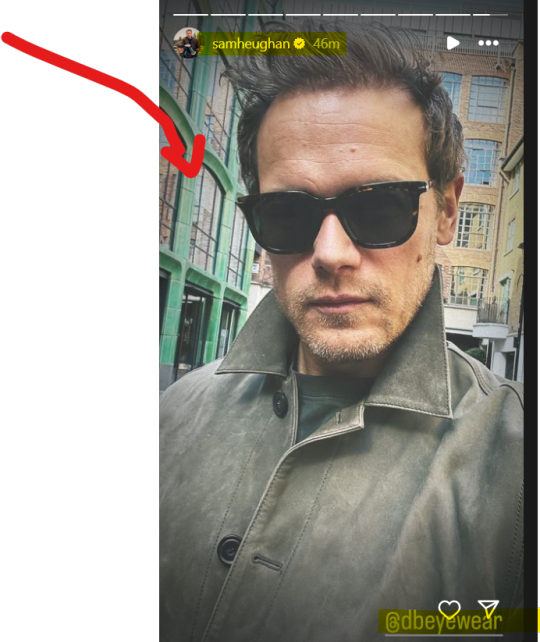
📌at Bourne Offices, 11 Richmond Buildings, in Soho:
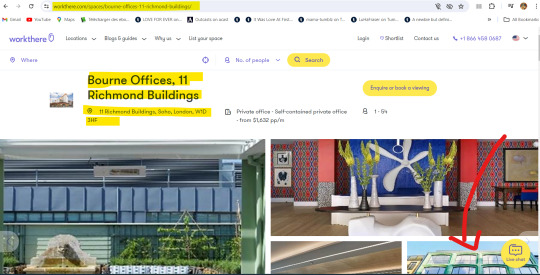
Literally round the corner from Soho House, on Dean Street. Of course:

Also, this - very telling:
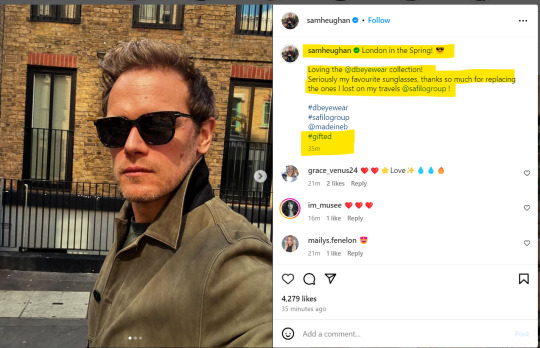
#gifted. Before *urv starts her demented Fitness at Dawn - The London Hyrox Edition fanfic, let's unpack:
S chose to wear, in this post, one of the sunglasses models from David Beckham's eyewear collection. Price tag is a bit steep (twice my Ray-Ban Wayfarers), but still democratic:
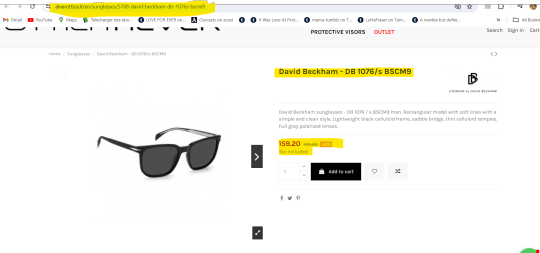
But why the #gifted hashtag? Before you think C or Scottish Xena lovingly picked those up the shelf for his birthday, you might like to check a bit around for context. You see, all dbeyewear collections are manufactured by a single Italian producer based in Padua, Safilo Group. Hashtagged accordingly in his post, by the way.
A couple of days ago, Safilo Group and dbeyewear's commercial partnership reached a new, very important milestone:
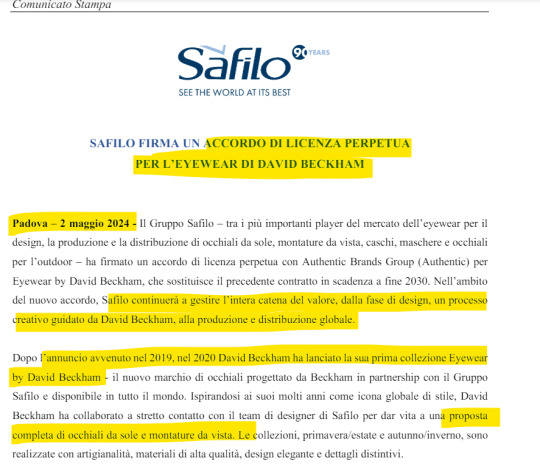
[Source: Safilo Group press release, https://assets.ctfassets.net/cmstik7jzbvm/2lwJmoKJR7x3ydijfpi7c6/9870e11fbb2c040a89a6d8acb4ed25ea/20240502_Safilo_firma_un_accordo_di_licenza_perpetua_per_l-eyewear_di_David_Beckham.pdf]
On May 2nd, Safilo Group and Authentic Brands Group (ABG), the corporate side of Eyewear by David Beckham signed a 'perpetual licensing agreement, replacing the current one that would have ended in 2030'. Authentic Brands Group and Safilo Group have been working together since 2019, when Beckham started to design his own eyewear collection. Now, they are taking their collaboration one step further, with ABG (or the licensor) granting Safilo Group (the licensee) perpetual (unlikely to be retired, unless something goes really, awfully wrong along the way: breach of contract, etc.) exclusive right to produce, use, advertise, sell its merchandise.
Something like this needs proper promotion, so Safilo Group and/or ABG graciously sent S those sunglasses, in the hope he will sport them in one of his posts with a potential 3+ million subscriber views.
A word on the UK pretty obscure regulations on promoter advertising and the use of the #gifted hashtag. There is not one, but two competent national regulatory authorities: the Advertising Standards Authority (ASA) and the Competition and Markets Authority (CMA). The ASA is a bit more lenient in its approach and they clearly say that if the promoted product has been sent to the influencer on a no strings attached basis, then it is ok to use that #gifted hashtag. They will not pursue, based on the lack of #ad, however they will name and shame you - not a pretty picture, after all:
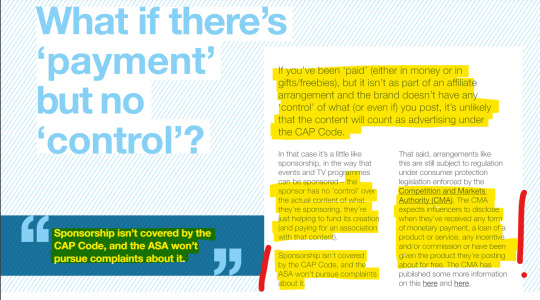
[Source, heh: ASA's Influencer Guide to making clear that ads are ads, https://www.asa.org.uk/static/uploaded/3af39c72-76e1-4a59-b2b47e81a034cd1d.pdf]
But the CMA is way more vigilant. They consider that any freebie can and must be monetized, based on its retail value and as such, must be clearly labeled as an #ad, when promoted on socials by an influencer. And yes, they can and might pursue, at any given moment: that must be proportional with the offence and in S's case, it might simply mean being served with a cease and desist notice or a removal and prohibition order. I'd rather not be in those shoes, mind you:


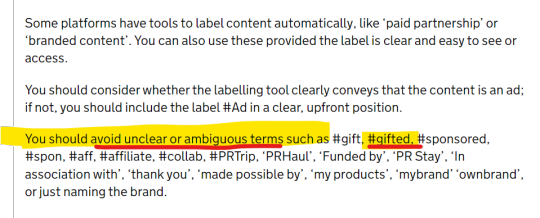
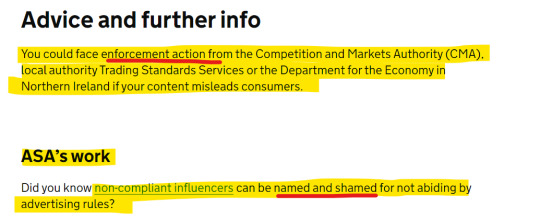
[Source: CMA's guide Hidden ads: Being clear with your audience, 2022; https://www.gov.uk/government/publications/social-media-endorsements-guide-for-influencers/social-media-endorsements-being-transparent-with-your-followers]
If he wants no further headaches, he should simply edit that post and add the right hashtag. It will be interesting to see if and when he will do it.
As for Fitness at Dawn, well... not even sorry.
Gracias a ti, ❤️. Siempre.
71 notes
·
View notes
Note
Out of curiosity, why didn't the Battle of Helm's Deep/the Hornburg and the Battle of Pelennor Fields get, well, Battles printed in any of the Lord of the Rings products?
The Black Gate got a random Gate, so it just seems like a missed opportunity.
The Lord of the Rings was actually designed before March of the Machine as Universes Beyond products have numerous review cycles with the licensor and thus have a longer design schedule. So why didn't it have Battles? Battles didn't exist yet.
46 notes
·
View notes